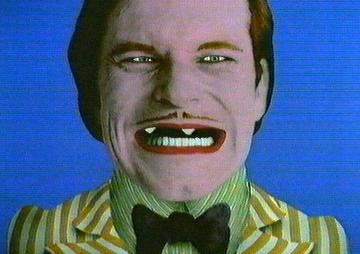Post by Fenril on Jun 23, 2005 14:19:08 GMT -5
Well, summer is finally here, so here's the review I promised quite a while ago. Bear in mind that it's the first time I review a movie in this board. Please excuses any mistakes.
So, without further ado, here's:
The last temptation of Christ (1988)
USA
Directed by: Martin Scorsese.
Based on the novel by Nikos Kazantzakis.
Starring: Willem Dafoe (Jesus), Harvey Keitel (Judas), Paul Greco (Zealot), Verna Bloom (Mary, Mother of Jesus), Barbara Hershey (Mary Magdalene).
The life of Jesus Christ on the road to become a saint and marthyr, even as he struggles with his destiny and his own nature ("The devil can be exorcised; but what do you do when your son is possessed by God?"). As based on the Kazantzakis novel --itself based on the Gnostic texts, not on the traditional Bible, this movie is not at all concerned with the traditional potrayal of Christ as a redemptive figure, and instead concerns itself with the human behind the legend, his fears, passions and all-too-human incomprehension of his own divinity. This Christ is as much in awe of his own miracles as is the people around him, has feelings (in the case of Mary Madgalene, very passionate feelings indeed) and would have given anything not to have to live up to the standards of being God's child.
Almost universally derided since its inicial release, mainly from so-called christian groups that apparently missed the whole point of the final scene, this is certainly an ambitious movie that, luckily, lives up to its own expectations. A cynic yet poignant atmosphere prevails (such as when Christ accused Saint Paul of being a liar, by preaching about Christ's own death), and incorporates such unusal details as the correct crucifixion (they didn't nail the hands, you see) and a zombie-cum-hippie version of Lazarus, and several tricky appereances by Satan himself.
Of course, like many movies based around Christ and other characters of the Judeo-Christian mythology (fine, "lore"), this movie expects all its viewers to be already familiar with the entire story, and thus some scenes could feel a bit unexplained.
I don't know if this can be called a Catolic movie (probably not), but it's certainly a thought-provoking viewing experience.
So, without further ado, here's:
The last temptation of Christ (1988)
USA
Directed by: Martin Scorsese.
Based on the novel by Nikos Kazantzakis.
Starring: Willem Dafoe (Jesus), Harvey Keitel (Judas), Paul Greco (Zealot), Verna Bloom (Mary, Mother of Jesus), Barbara Hershey (Mary Magdalene).
The life of Jesus Christ on the road to become a saint and marthyr, even as he struggles with his destiny and his own nature ("The devil can be exorcised; but what do you do when your son is possessed by God?"). As based on the Kazantzakis novel --itself based on the Gnostic texts, not on the traditional Bible, this movie is not at all concerned with the traditional potrayal of Christ as a redemptive figure, and instead concerns itself with the human behind the legend, his fears, passions and all-too-human incomprehension of his own divinity. This Christ is as much in awe of his own miracles as is the people around him, has feelings (in the case of Mary Madgalene, very passionate feelings indeed) and would have given anything not to have to live up to the standards of being God's child.
Almost universally derided since its inicial release, mainly from so-called christian groups that apparently missed the whole point of the final scene, this is certainly an ambitious movie that, luckily, lives up to its own expectations. A cynic yet poignant atmosphere prevails (such as when Christ accused Saint Paul of being a liar, by preaching about Christ's own death), and incorporates such unusal details as the correct crucifixion (they didn't nail the hands, you see) and a zombie-cum-hippie version of Lazarus, and several tricky appereances by Satan himself.
Of course, like many movies based around Christ and other characters of the Judeo-Christian mythology (fine, "lore"), this movie expects all its viewers to be already familiar with the entire story, and thus some scenes could feel a bit unexplained.
I don't know if this can be called a Catolic movie (probably not), but it's certainly a thought-provoking viewing experience.








